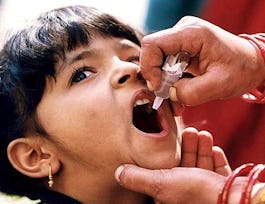This course is all about infectious diseases. We’ve selected four disease areas — HIV, Malaria, Emerging Infectious Diseases (Ebola and Zika), and TB — and we will go through each in turn. We’ve selected these diseases because they span a range of different types of disease and allow us to look at important issues that relevance of other diseases too. We will look at each disease in the same way: we begin by looking at the aetiology and epidemiology of the diseases. We then show how data on this disease can be used to understand important trends and patterns. We then focus on the interventions that can be used to address that disease - typically spanning both prevention and treatment - and consider how policies have been developed to address the disease. We finish by reflecting on the whole topic area of the disease with an external expert.



Global Disease Masterclass: Communicable Diseases Epidemiology, Intervention and Prevention
This course is part of Global Disease Masterclass Specialization


Instructors: Helen Ward
Sponsored by IEM UEM Group
6,135 already enrolled
(179 reviews)
Skills you'll gain
Details to know

Add to your LinkedIn profile
8 assignments
See how employees at top companies are mastering in-demand skills

Build your subject-matter expertise
- Learn new concepts from industry experts
- Gain a foundational understanding of a subject or tool
- Develop job-relevant skills with hands-on projects
- Earn a shareable career certificate


Earn a career certificate
Add this credential to your LinkedIn profile, resume, or CV
Share it on social media and in your performance review

There are 4 modules in this course
This week you will look at HIV, an infectious disease that emerged in the 1980s and has become one of the leading causes of death in many countries. You will first look at how HIV affects the immune system and causes AIDS and how it spreads from person to person. You will then review the state of the global epidemic and look at current trends in specific countries. There are many interventions that are available to help prevent transmission and to treat persons who are HIV-positive, and you will review the evidence for each. You will review and critique the strategy that has been developed to ‘end AIDS’ by UNAIDS, the UN agency tasked with leading the fight against AIDS.
What's included
9 videos6 readings2 assignments4 discussion prompts2 plugins
Malaria is one of the most high-profile infectious diseases and a major cause of death in young children in many parts of the world. You will first learn about the complicated way that malaria spreads from person to person via mosquitoes. This knowledge will help you to make sense of the relationship between climate and the global distribution of malaria, and you will explore this yourself using fine-scale geographic data. You will then look at the available interventions for combatting malaria and review and critique the WHO’s strategy for combating Malaria.
What's included
5 videos2 readings2 assignments3 discussion prompts2 plugins
An important theme in infectious disease research is that new outbreaks can occur. You will look at two diseases that have emerged (or re-emerged) recently – Ebola and Zika. For each in turn, you will learn about what the disease is, how it is spread and the story of the most recent outbreaks. You will also learn about the challenges of trying to understand the nature of an epidemic whilst is it starting to spread, and you will examine data from the 2014 West Africa Ebola epidemic yourself. Finally, you will review strategies have been developed for responding to outbreaks and look at some of the development that are underway that should improve our ability to respond in the future.
What's included
5 videos3 readings2 assignments2 discussion prompts
The infectious disease that probably causes the most death worldwide today than any other is Tuberculosis, an ancient diseases that is posing new challenges in high and low income settings. Study this week begins with a review of how TB spreads and causes diseases and a close look at spread of disease in several different global settings. The mainstay approach has been providing treatment and you will learn how this has been done and how new approaches and seeking to do more. Prevention of TB touches on many aspects of health care and development, as well as pharmaceuticals and vaccine development, and you will learn about all the current avenues of research and implementation. Finally, you will read and critique current international strategies for ending the TB epidemic.
What's included
6 videos3 readings2 assignments2 discussion prompts
Instructors

Offered by
Why people choose Coursera for their career




Learner reviews
179 reviews
- 5 stars
79.88%
- 4 stars
15.64%
- 3 stars
3.35%
- 2 stars
0.55%
- 1 star
0.55%
Showing 3 of 179
Reviewed on May 28, 2020
Great course - really made me think and refresh my knowledge of communicable disease!
Reviewed on Jun 3, 2020
I learned lots of knowledge from this course. This course is very much useful to know more about Communicable diseases and their interventions.
Reviewed on Aug 3, 2020
I´m still hungry for more details, but overall I really enjoyed this course. Thank you.
Recommended if you're interested in Health

Imperial College London

Imperial College London

Imperial College London

Johns Hopkins University

Open new doors with Coursera Plus
Unlimited access to 10,000+ world-class courses, hands-on projects, and job-ready certificate programs - all included in your subscription
Advance your career with an online degree
Earn a degree from world-class universities - 100% online
Join over 3,400 global companies that choose Coursera for Business
Upskill your employees to excel in the digital economy


